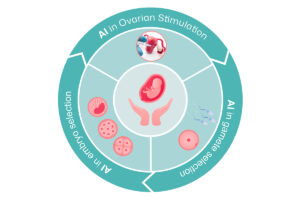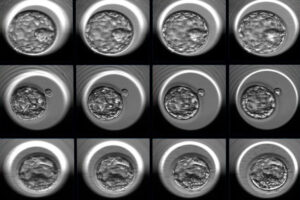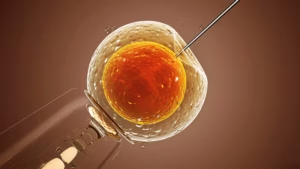AI in IVF

Artificial Intelligence In In-Vitro Fertilization
In Vitro Fertilization (IVF) is one of the most popular techniques used in Assisted Reproductive Technology (ART). It is estimated that about 12 million babies have been born through IVF.
IVF has helped several couples with infertility become proud parents. In this procedure, eggs are extracted from a woman’s ovaries and fertilized by sperm outside the body, in a laboratory. The resulting embryo is then transferred to the mother’s womb.
Since its beginning in 1978, various advanced technologies have been introduced in IVF to make it more accurate and effective. The latest addition is to this is Artificial Intelligence.
Although it is just in the beginning stages in reproductive medicine, AI has a promising scope in IVF. AI can use its advanced algorithms to analyse a bulk of patient data, and hence optimize decisions and increase success rates in IVF.
How AI is Used in Different Stages of IVF
1. Personalizing Ovarian Stimulation
Ovarian Stimulation is one of the initial steps in IVF that aims to harvest multiple eggs in a single cycle. However, over or under-stimulation can have a negative impact on the patient’s health.
AI can personalize stimulation by analyzing:
– Historical data from previous cycles.
– Age, Anti-Müllerian Hormone (AMH) levels, and antral follicle count (AFC)
– How a patient might react to the stimulation before the cycle even begins.
Some studies have shown that AI can reduce the risk of Ovarian Hyperstimulation Syndrome (OHSS) and improve egg yield.

2. AI in Gamete Selection
In IVF, choosing the healthiest possible gamete is critical for a successful pregnancy. Typically, the gametes are chosen as per the subjective judgment of the embryologists. Incorporating AI can make the process more objective. Using advanced image recognition and machine learning models, AI can objectively rank gametes based on their quality.
The use of AI in egg selection may be limited, as the general practice is to fertilize all retrieved eggs. However, it can be exceptionally useful during the selection of sperm for intracytoplasmic sperm injection (ICSI).
AI tools can analyze:
– Sperm motility and movement patterns.
– Sperm shape and size.
– Genetic markers and other bio-signatures.
3. Embryo Selection
AI can play a valuable role in embryo selection. As a general practice, embryologists manually go through multiple time-lapse images and examine the morphological data to select the most viable embryo. However, this process is time-consuming and subjective, too.
AI tools can be trained to process thousands of embryo images and do the following:
– Identify the embryo with the highest chances of successful implantation in the uterine wall.
– Predict any chromosomal abnormalities in the embryo
For example, Life Whisperer, an AI tool approved in some countries, claims to predict the likelihood of a successful pregnancy by examining the embryo’s morphology on Day 5. It is an objective, non-invasive tool that helps IVF specialists make more informed decisions.

4. Predicting IVF Outcomes
AI systems can be trained on thousands of IVF cycles to predict whether or not a pregnancy will take place. These tools factor in:
– Age of Patient, AMH levels, and BMI
– Hormonal response to previous cycles
– Sperm and egg quality
AI-powered models, such as those developed by Cornell and Harvard Medical Schools, have exhibited predictive accuracies of up to 90% when assessing embryos based on morphokinetic data.
These predictive tools not only help in clinical decisions but also offer mental support to patients by setting out real expectations earlier in the process.
Ethical Considerations and Challenges
Despite some remarkable applications, AI in IVF can also give rise to several ethical and regulatory concerns, such as:
- Data Privacy: Confidential medical data must be protected with high-level encryption and compliance with the laws.
- Algorithm Bias: AI models should be trained on a variety of datasets to avoid any biased decision-making based on ethnicity or socioeconomic factors.
- Human Element: AI should complement, not replace, clinical judgment. Final decisions must remain in the hands of trained fertility specialists.


Final Thoughts
Artificial Intelligence is not just a buzzword in IVF—it could potentially revolutionize fertility care. From improving embryo selection to predicting results and personalizing treatments, at Corion, we are embracing AI as a technology that makes IVF more efficient, less stressful, and more successful.
As AI tools continue to develop and undergo clinical validation, they are destined to become standard practice in reproductive medicine. The future of IVF lies in the fusion of compassionate care and cutting-edge technology.
Frequently Asked Questions (FAQs)
AI can help in the selection of the most viable gamete and embryo. It can also assist in monitoring hormone levels and predicting IVF outcomes.
AI can identify intricate patterns and minor changes in the heart rates of the fetus, which can hint at potential health issues. This approach can be very helpful to expectant mothers and babies.
AI utilizes advanced algorithms to examine time-lapse images and morphological data of all the embryos. It predicts embryo viability and suggests which one could have the best implantation outcomes.
Multiple studies have demonstrated that AI could assist in every step of IVF, from ovarian stimulation to embryo selection, hence significantly improving success rates.
AI does not interfere with your bodily functions or embryos. It observes and examines in a non-invasive way, and it only acts as a decision-support tool in IVF.
Copyright © 2025, Corion. All Rights Reserved.
Website is designed & developed by Phi Brands


